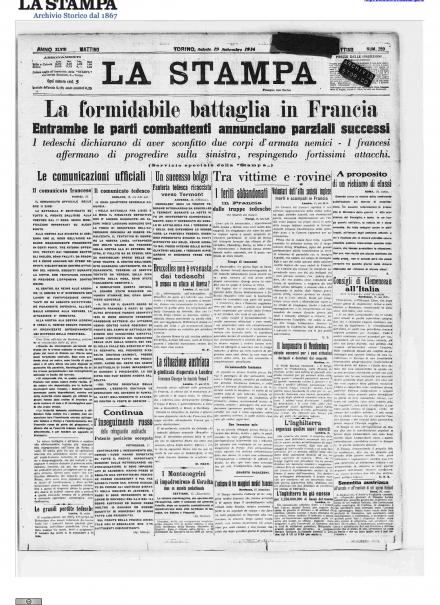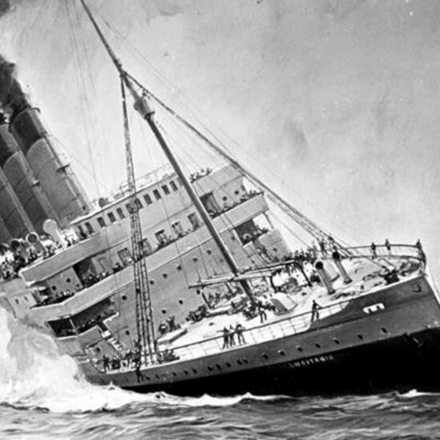C'era una volta Reims
Il 19 settembre Reims non è più Reims. Al terzo giorno di bombardamenti la città è trasfigurata, sfregiata dalla furia della battaglia. Della splendida cattedrale gotica è riconoscibile solo la facciata anteriore; il resto è polverizzato o accartocciato al suolo, informe, svanito nei calcinacci e annerito dalle fiamme.
I tedeschi colpiscono sull’Aisne e i forti intorno alla Meuse, nella regione di Verdun. Non la definirei una vera e propria controffensiva, troppo bloccata la fanteria; sembra piuttosto un apocalittico fuoco di sbarramento. Poco più a sud inizia la battaglia di Flirey.
Gli Alleati stanno per ricevere rinforzi: il primo dei tre corpi di spedizione indiani ha lasciato l’Egitto, destinazione Marsiglia. Quasi tutte le colonie britanniche hanno risposto subito “presente” agli appelli di Londra.
Inghilterra e Francia hanno intanto garantito al Belgio l’integrità di tutti i suoi possedimenti coloniali. Ma la trattativa diplomatica più interessante del giorno arriva dall’Est: Russia e Romania firmano un patto segreto.
Sul contenuto del documento è però possibile azzardare qualche ipotesi. E una prima indicazione la danno due deputati rumeni in missione a Roma. Hanno parlato con il Governo italiano, altra grande neutralità nello scacchiere bellico. Ma più interessante ancora è l’intervista rilasciata a La Tribuna. I due delegati di Bucarest parlano abbastanza chiaro: non si potrà restare neutrali per sempre, non conviene. E a quel punto non ci sarebbe storia, la preferenza punta dritta sulla Triplice Intesa; di tedeschi e austro-ungarici non si fidano.
Davide Sartori
GLI AVVENIMENTI
Politica e società
- Concluso un accordo segreto di aiuto reciproco fra il Governo russo e quello rumeno.
- Il Governo britannico e quello francese garantiscono al Belgio l’integrità delle sue colonie.
- A Welshmen discorso di Lloyd George, Cancelliere dello Scacchiere, sulle atrocità compiute dai tedeschi.
- L’Ammiraglio inglese Troubridge subisce un richiamo per la fuga degli incrociatori tedeschi “Goeben” e “Breslau”, riparati nel porto di Istanbul.
- La prima unità “A” dell’Expeditionary Force Indiana lascia l’Egitto per Marsiglia.
Fronte occidentale
- Aisne: attacchi pesanti da parte dei tedeschi, colpiti anche i forti intorno alla Meuse nella regione di Verdun.
- I tedeschi bombardano ancora Reims e distruggono la cattedrale “Notre Dame”. I tedeschi si giustificano affermando che i francesi vi avevano stabilito un posto di osservazione.
- Successi francesi sull'Altipiano di Craonne.
- Inizia la battaglia di Flirey.
Fronte orientale
- Da una settimana si susseguono sconfitte austro-ungariche in Polonia e in Galizia.
Fronte meridionale
- Cattaro ancora bombardata da uno squadrone francese.
Parole d'epoca
Anonimo
Lettera a Sua Maestà Vittorio Emanuele III
SIRE!
Vogliamo augurarci che Sua Eccellenza il Ministro Mattioli Pasqualini vorrà presentare questo telegramma a Vostra maestà.É ormai tempo che abbia fine questa tresca scandaloso e immorale con gli Imperi Germanico e Austro-Ungarico Il Popolo Italiano non la può più soffrire, ne è indignatissimo, medita e prepara la ribellione.-Occorrono urgenti riflessioni e azione dalla Maestà Vostra e consigli ai Ministri Salandra e Di Sangiuliano, perchè non si rendano più oltre complici delle barbarie e insulti di Cotesti Imperi al mondo civile.[
Tutte le classi sociali e Esercito e Marina sono indignate delle incivili repressioni ai nobili sentimenti e alle patrie aspirazioni del Popolo Italiano; e il temporale sta per scatenarsi e la bufera imperverserà sull'Italia se i Ministri della Maestà Vostra non daranno un nuovo indirizo alla politica estera accompagnata da una azione militare.[
Saranno avvisati con altro telegramma gli Onorevoli Salandra e Di Sangiuliano.
Maestà! Uomo avvisato è mezzo salvato!
Ossequissimi della Maestà Vostra devotissimi pel Comitato di vigilanza Un gruppo di personalità politiche Un gruppo di ufficiali del R. Esercito Un gruppo di ufficiali della R. Marina
Documenti
The US Statement on the Status of Armed Merchant Vessels
Department of State Washington, September 19, 1914
A. A merchant vessel of belligerent nationality may carry an armament and ammunition for the sole purpose of defense without acquiring the character of a ship of war.
B. The presence of an armament and ammunition on board a merchant vessel creates a presumption that the armament is for offensive purposes, but the owners or agents may overcome this presumption by evidence showing that the vessel carries armament solely for defense.
C. Evidence necessary to establish the fact that the armament is solely for defense and will not be used offensively, whether the armament be mounted or stowed below, must be presented in each case independently at an official investigation. The result of the investigation must show conclusively that the armament is not intended for, and will not be used in, offensive operations. Indications that the armament will not be used offensively are:
1. That the caliber of the guns carried does not exceed six inches.
2. That the guns and small arms carried are few in number.
3. That no guns are mounted on the forward part of the vessel.
4. That the quantity of ammunition carried is small.
5. That the vessel is manned by its usual crew, and the officers are the same as those on board before war was declared
6. That the vessel intends to and actually does clear for a port lying in its usual trade route, or a port indicating its purpose to continue in the same trade in which it was engaged before war was declared.
7. That the vessel takes on board fuel and supplies sufficient only to carry it to its port of destination, or the same quantity substantially which it has been accustomed to take for a voyage before war was declared.
8. That the cargo of the vessel consists of articles of commerce unsuited for the use of a ship of war in operations against an enemy.
9. That the vessel carries passengers who are as a whole unfitted to enter the military or naval service of the belligerent whose flag the vessel flies, or of any of its allies, and particularly if the passenger list includes women and children.
10. That the speed of the ship is slow.
D. Port authorities, on the arrival in a port of the United States of an armed vessel of belligerent nationality, claiming to be a merchant vessel, should immediately investigate and report to Washington on the foregoing indications as to the intended use of the armament, in order that it may be determined whether the evidence is sufficient to remove the presumption that the vessel is, and should be treated as, a ship of war. Clearance will not be granted until authorized from Washington, and the master will be so informed upon arrival.
E. The conversion of a merchant vessel into a ship of war is a question of fact which is to be established by direct or circumstantial evidence of intention to use the vessel as a ship of war.














